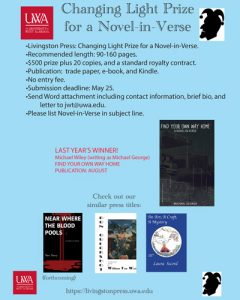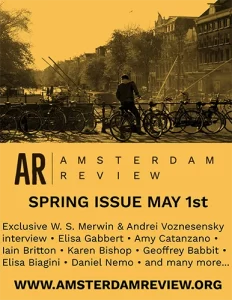Southern Humanities Review – Spring 2008
Volume 42 Number 2
Spring 2008
Quarterly
Dan Moreau
Published out of Auburn University, Southern Humanities Review has a distinctly academic flavor. Ann Struthers’s series of poems in formal verse pays tribute to the Romantic poet Coleridge. Among the poetry I also liked Bruce Cohen’s “Hotel Chain” which explores the creepiness of hotel rooms. He writes: “Bibles are blank / & escort services are circled in the yellow pages.” In T. Alan Broughton’s “Legacy,” a father comes to grip with his own father’s habit of arguing with him: “We still argue, my father and I, / although he’s dead. He leans on the table, / meshing his hands, gently chiding, never raising his voice.”
Published out of Auburn University, Southern Humanities Review has a distinctly academic flavor. Ann Struthers’s series of poems in formal verse pays tribute to the Romantic poet Coleridge. Among the poetry I also liked Bruce Cohen’s “Hotel Chain” which explores the creepiness of hotel rooms. He writes: “Bibles are blank / & escort services are circled in the yellow pages.” In T. Alan Broughton’s “Legacy,” a father comes to grip with his own father’s habit of arguing with him: “We still argue, my father and I, / although he’s dead. He leans on the table, / meshing his hands, gently chiding, never raising his voice.”
In Mathew Smith’s story “Islanders,” a transplanted Hawaiian working as a meteorologist at a Minnesota TV station starts dating a man in her office who may or may not have an Asian fetish. Smith has a knack for describing Minnesota winters and the inner workings of meteorology:
Radar, aircraft, geostationary satellites – the satellites images were her favorite. The reds and greens of heat, the planet’s loose moisture like a living thing unfurling. She would hold these images in her head and look into the sky. It was a secret about the world that only she understood.
In Patricia Foster’s “The Visit, 1946,” a female protagonist reevaluates her relationship with her fiancé after meeting the latter’s mother. The best treat this issue of SHR has to offer, though, is a travel essay on Venezuela by Brian A. Nelson. In it he chronicles his time spent in the oil town of Maracaibo, which is as lawless and violent as the Old West. Car accidents and kidnapping are everyday occurrences. He reports that the state of the country has less to do with outside influences than the sheer nature of Venezuelans: “There was no Pinochet here, no Batista, no Trujillo. The history of Venezuela is the history of Venezuelans cheating, defrauding, and robbing other Venezuelans and then trying to blame someone else for their crimes.”
[www.auburn.edu/english/shr/home.htm]




